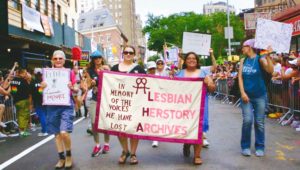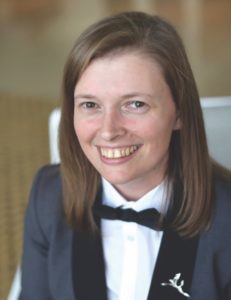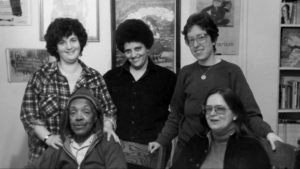
The 35th annual Provincetown Women’s Week, which officially runs from Oct. 14 to 20, celebrates, among many things, lesbian visibility. It’s fitting, then, that one of the most popular events of the week is likely to be a film about the efforts of a few women, starting in 1970s, to document lesbian lives so they would not be erased from history.
“The Archivettes,” directed by Megan Rossman, who’ll be on hand for post-screening discussions all week at the Waters Edge Cinema, is a 60-minute documentary about the Lesbian Herstory Archives in New York City, the world’s largest collection of materials by and about lesbians and their communities. The film traces how co-founders Joan Nestle and Deb Edel began, in the early ’70s, to collect artifacts and documents that they catalogued and organized in their apartment on Manhattan’s Upper West Side. When the collection — everything from books, audio- and videotapes, letters, photographs, and diaries to military and softball uniforms — began to overwhelm the space, the LHA founders and volunteers bought and renovated a building in the Park Slope neighborhood of Brooklyn. It opened in June 1993 and today houses the LHA’s ever-expanding collection, maintained by a dedicated group of young interns and volunteers.

Filmmaker Rossman, a former multimedia journalist at the Washington Post and now an assistant professor of communications at Purchase College, part of the State University of New York, discovered the archive when she realized how close they were to her apartment in Brooklyn. There she met Edel and Maxine Wolf, activists in the gay and women’s liberation movements and later with ACT UP.
“I felt a connection to my own history when I walked into the building,” Rossman says. She instantly knew she wanted to make a film depicting not only the ongoing efforts of the archives, but the “intergenerational dynamics” of young interns and volunteers working alongside elders to organize the many donated items (from tax documents to T-shirts) that continue to flow in from all over the world.
The project turned out to be a professional and personal milestone. “I came into myself while working on the film,” says the 33-year-old Rossman. Growing up in Ohio, she says, she wasn’t exposed to an older generation of lesbians who’d paved the way. Those whom she met while filming at the LHA “treated me like family immediately.”
Rossman shot interviews with Edel, Wolfe, Judith Schwarz, and other longtime members of the LHA collective, as well as the younger interns and volunteers. She traveled to Australia to interview Nestle, who’d moved there after decades of serving as the LHA’s leader and maternal figure. “The film wouldn’t be complete without her,” Rossman says. “They all talked so much about Joan, I felt like I knew her before I met her. She embraced me and was so impressed that I’d fly around the world to interview her.”
There was a sense of urgency in documenting the stories and the voices of women who are now well into their 70s and 80s. Historian Schwarz, who joined the collective in 1978, talks in the film about living through police raids on gay bars in Oakland. Two months after filming, Schwarz suffered a stroke that left her with some memory impairment.

A prominent LHA member was Mabel Hampton, who died in 1986 and who appears in vintage footage in “The Archivettes.” Hampton, who was born in 1902, donated oral histories to the archives that include her colorful tales of drag balls and wild parties in 1920s Harlem. She could have been the subject of her own film, says Rossman.
“The Archivettes” premiered at Outfest in Los Angeles this past summer and after Provincetown will continue screening at festivals. “People are very excited to learn that the archive exists,” she says. It also prompts many to think about archiving their own lives, particularly in the digital age, when records are likely to be stored on cell phones or laptops rather than physical media. There is an impermanence to this technology, Rossman says. “The archives could get a donation of zip drives and not be able to open them. That information would be lost forever.”
Rossman first explored the work of the LHA in her seven-minute short, “Love Letter Rescue Squad,” which won best student documentary in the Emerging Filmmakers Showcase at the Cannes Film Festival American Pavilion in 2017. “The response was so positive, I realized many other people cared about this, not just me,” she says. Rossman has begun working on her next film, a short about poet Naomi Replansky, now 101, who appears briefly in “The Archivettes.”
On Oct. 27, “The Archivettes” will screen at the NewFest LGBTQ film festival in New York City, where “a huge contingent from the archives will be there,” Rossman says. After the festival circuit, Rossman plans to present the movie at community screenings and at colleges and high schools. “If I knew about this generation of LGBT women when I was younger, I would have been more comfortable coming out sooner,” she says. “I just felt so embraced by them.”
